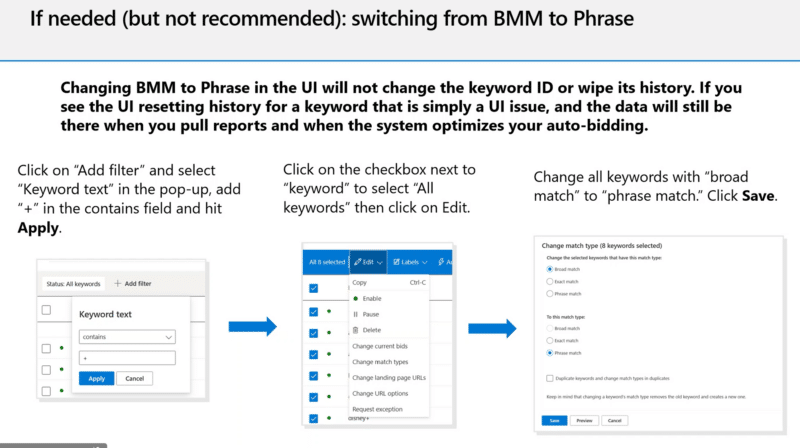Starting on March 15, Microsoft Advertising will be changing the way broad match modifier (BMM) keywords are served for search ads.
What’s happening. Currently, BMM keywords serve as phrase match, but they will now begin to serve as broad match. This change will be rolled out gradually, and Microsoft Advertising expects to maintain stable performance. The company has been working to improve the algorithmic performance of broad match, and it expects this change to deliver high-quality results. Advertisers who have tested this new system have reported seeing an improvement in conversion volume while maintaining the cost per acquisition (CPA).
Updating your accounts. There is no need for advertisers to take any action at this point. Microsoft Advertising recommends that advertisers monitor their performance for at least two weeks before making any adjustments. This change will not impact bidding strategies or 3rd party bidding, and the company encourages advertisers to continue using autobidding just as they do today.
If advertisers do not want to serve this way, they can update their match types in the UI. However, Microsoft Advertising does not recommend this approach. If advertisers decide to change the match type, it is strongly advised that they make the changes in the UI to avoid creating new keyword IDs and losing historical data. It is also acceptable to leave the “+” when updating the match type, as the system will ignore it.

Dig deeper. You can learn more about BMM from the Microsoft Ads help documentation.
Why we care. This change could affect the way ads will be served on the Microsoft platform. Broad match modifier (BMM) keywords will now serve as broad match, which means that the keywords will match with a wider range of search queries. This change can impact the relevance and quality of the ads shown to users, as well as the cost and efficiency of their advertising campaigns.
However, Microsoft Advertising has indicated that this change is not expected to negatively impact performance and may even lead to improved conversion volume while maintaining CPA. Advertisers should monitor their campaigns’ performance closely after the change and make adjustments if necessary.
Related stories
New on Search Engine Land

